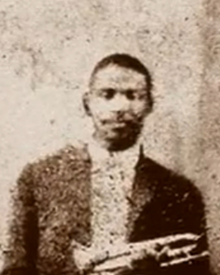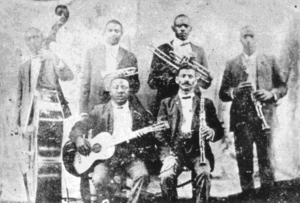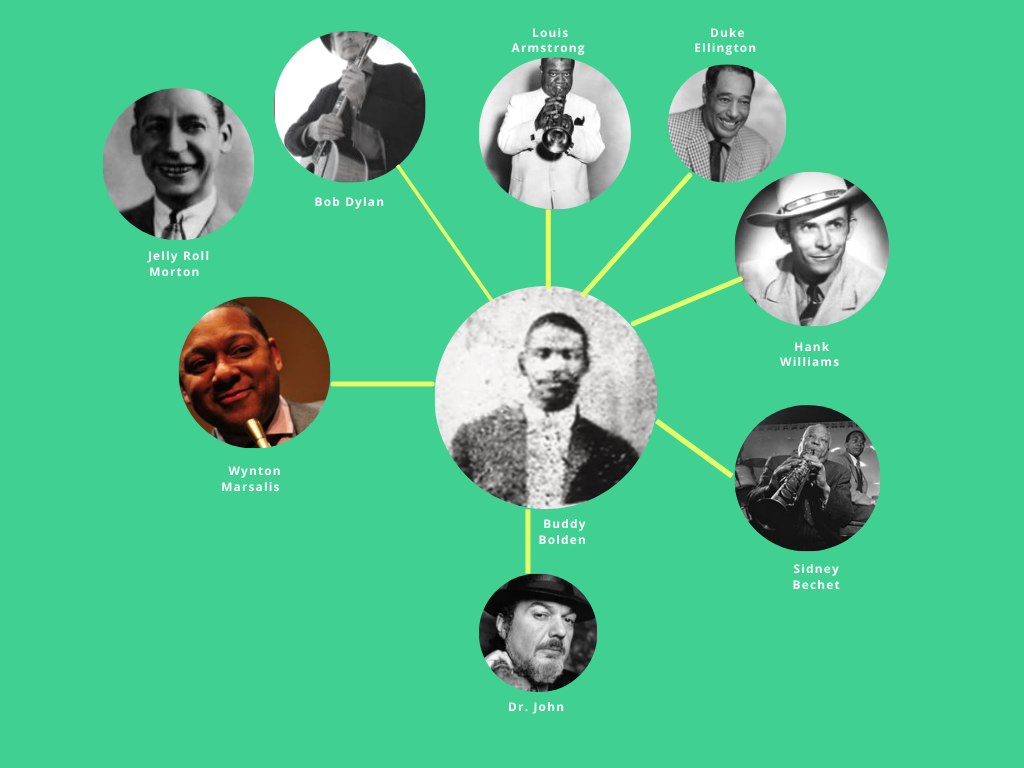
Thought I heard, Buddy Bolden say…
In this week’s Musical Tree we explore another great and uniquely American form of music – jazz. Like blues and country music, jazz is a form of American music that has a rich and colorful history. As this and future Musical Trees will explore, jazz has had a profound impact on popular music that we hear today across multiple musical genres. With so many artists to choose from, I decided to start at the beginning with the artist known as King Bolden. This is the story of Charles ‘Buddy’ Bolden.
Buddy Bolden was born in New Orleans in 1877. When he was six his father died and for the remainder of his childhood he was raised by his mother and other relatives. Other than that, there is not much that is known about his childhood. In fact, the earliest history we have on Buddy Bolden was when he burst onto the New Orleans music scene in the 1890’s.
Buddy Bolden played the cornet. Instead of imitating other cornetists, Bolden played the music that his ears heard and adapted it to his horn. Bolden was known for his loud sound, and in what would become a hallmark of jazz, his improvisational skills. Bolden and his style of music is now recognized as the main influence on what became known as jazz music. Interestingly, the term jazz wasn’t coined until a few years after Bolden stopped playing.

Bolden and his band were unique in many ways. First, they incorporated a looser style of ragtime. Secondly, they added blues and his band was the first to have brass instruments play blues music. Bolden also incorporated the gospel music that he heard in African-American Baptist churches. String instruments became the rhythm section and the horns – clarinets, trombones, and Buddy’s cornet – were front and center. In doing so, Bolden changed the traditional New Orleans dance music into a wonderful blend of ragtime, black sacred music, marching band music, and blues.
Bolden and his band liked to play loud. Buddy brought improvisation into his music – fans would refer to Bolden being in “the trance” as he played his music. As people would walk through the night, they would hear his cornet, playing wild notes while climbing the scales. They knew it was Buddy Bolden and they would flock to see him. Weekend afternoons would find Buddy and his band playing regularly in Lincoln Park. Legend has it that once the band was setup, Buddy would blow on his cornet, emitting a sound that could be heard from miles away. People would flock to Lincoln Park to hear Buddy and his band play their unique style of music.
By the early 1900’s the Buddy Bolden Band was the band in New Orleans. People would pack clubs to see them play on Saturday nights, often lasting until dawn before people would leave to go home and get ready for church. Fans would go crazy when the band played songs such as ‘Careless Love’, ‘My Buckets Got a Hole In It’ and others. Buddy’s music also became raunchier, with songs such as ‘Make Me a Pallet on the Floor’ and what became his signature song, ‘Funky Butt’.
‘Funky Butt’ was a song about the smell that arose from packed patrons dancing to Buddy’s music. It was a song deemed so obscene that even whistling the melody on the sidewalk could get you in trouble. Jelly Roll Morton, who falsely claimed that he invented jazz music years after Buddy did, recorded the song and renamed it ‘Buddy Bolden’s Blues’. Numerous other artists have recorded the song over the years, a testimony to the impact that Buddy Bolden had not only on jazz, but on New Orleans artists in general.
Buddy Bolden’s health started to deteriorate in 1906. His band became frustrated with his erratic performances. Buddy’s family also became concerned with his increasingly volatile behavior, behavior that some believed was brought on by years of alcohol abuse. Finally, on March 13, 1907 his mother had him arrested and he was sent to the Louisiana State Insane Asylum where he was diagnosed with dementia praecox, which today is known as schizophrenia. There Buddy lived out the rest of his life until his death on November 4, 1931.
There are no known recordings of the Buddy Bolden Band. In 1916 the term jazz was first mentioned to describe music coming out of New Orleans. Two years later the first jazz recording was released. In the mid-1920’s Louis Armstrong and his Hot Five took the world by storm. It is unknown if Buddy was aware of any of these events while he was institutionalized. It is sad to think that when jazz exploded in popularity in the 1920’s that Buddy was unable to participate, let alone if he was even aware. However, his impact to jazz music has been rightfully recognized, and continues to be even today.
Jazz great Wynton Marsalis has said that Buddy created the “Big Four” – a rhythmic innovation on the marching beat which gave jazz more room for individual improvisation. The “Big Four” was the first syncopated bass pattern to deviate from the standard on the beat march. Louis Armstrong said of Bolden, “He was just a one-man genius that was ahead of them all… too good for his time”.
To be honest the Musical Tree for Buddy Bolden could simply just say ‘Jazz’. I’ve included a few names but it is easy to see that Buddy Bolden was the starting point for what became known as jazz music, originating in New Orleans before spreading world-wide. Variations of songs that he played were made famous years later by artists from across the musical spectrum such as Louis Armstrong, Hank Williams, and Bob Dylan & The Band. ‘I thought I heard Buddy Bolden say’ is the first line in the Jelly Roll Morton song ‘Buddy Bolden’s Blues’. But oh how I wish that I could hear the blare of that cornet coming through the breeze on a steamy night in New Orleans, knowing that the master was about to lay down the groove until dawn – it would be well worth dealing with the funky butt.

I hope you enjoyed this week’s Musical Tree. Feel free to leave suggestions for future articles in the comments. Don’t forget to subscribe to be notified via email when there is a new post.
And you can now follow Tekesmusings.com on your social media of choice by clicking on the links at the bottom of the page! Until then, follow your passion, stay happy, and be thankful for whatever inspires you.


The Buddy Bolden Legacy Band does a superb job recreating these seminal tunes.
Pingback: Musical Tree Twenty! – Teke's Musings
Wonderful views on that!
Right on my man!